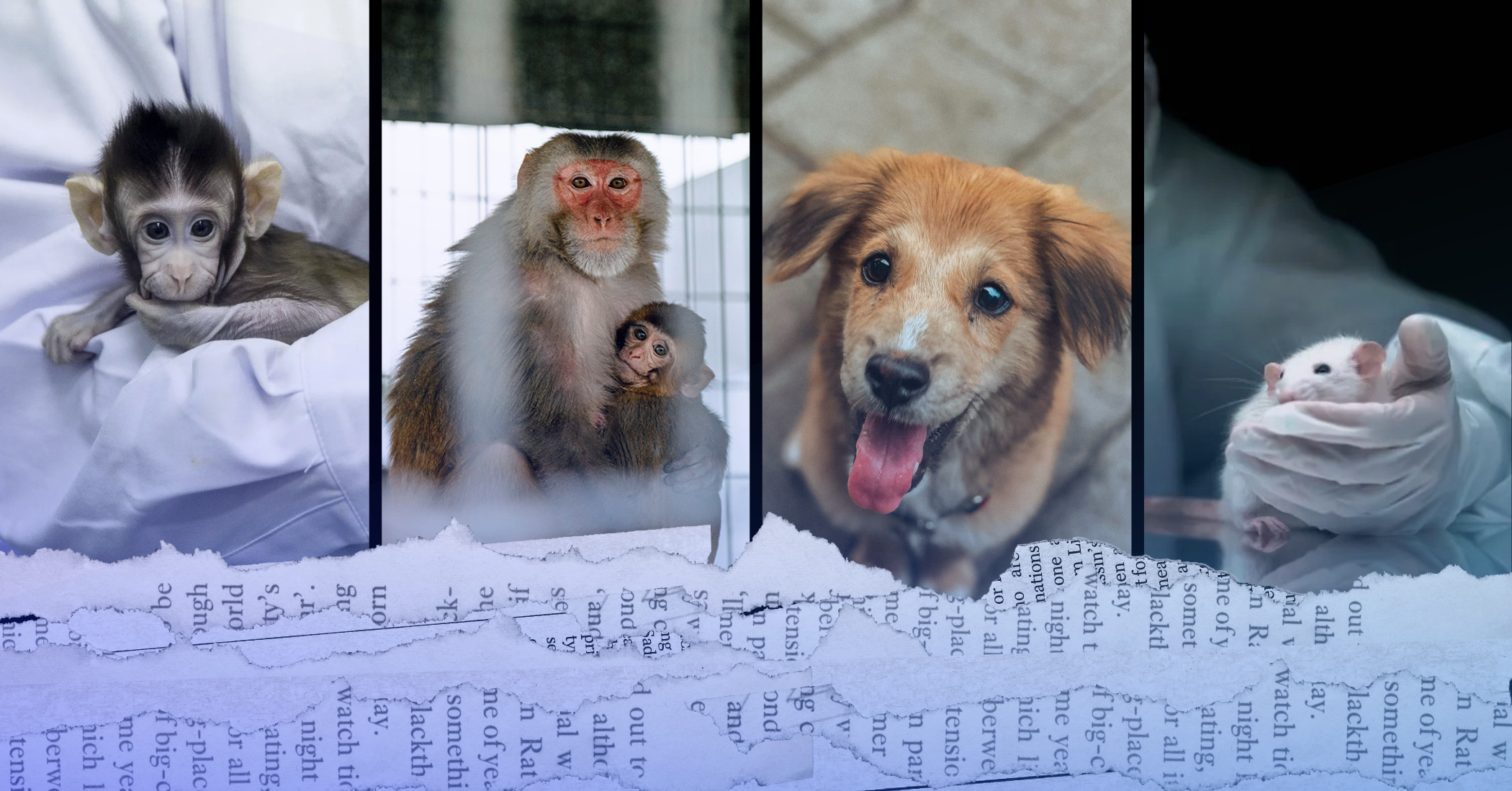
Here’s a roundup of the week’s biggest news stories related to animal research — all the recent media coverage you need to know right now to be the most effective activist for animals in labs.
 More Americans Are Saying No to Animal Research
More Americans Are Saying No to Animal Research
Rise for Animals, 11/20/2025
New polling shows a major shift: Americans across the political spectrum are rejecting animal testing.
This alignment is rare—and it’s important. It signals that the public is ready for a future built on ethical, human-relevant science. 📰 Full Story →
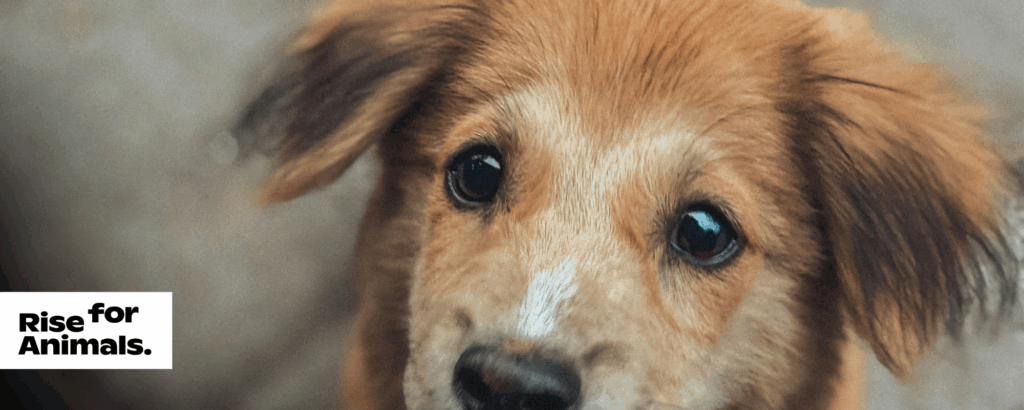 Protecting “Pets” While Hurting Others? That’s Not Justice
Protecting “Pets” While Hurting Others? That’s Not Justice
Rise for Animals, 11/17/2025
Ontario wants to ban dog and cat testing. That’s great—for those animals. But the plan does nothing to stop labs from harming other species.
Selective empathy isn’t justice. It’s speciesism—and it props up the animal research industry’s entire system. 📰 Full Story →
 US and UK look to cosmetics industry to end animal testing
US and UK look to cosmetics industry to end animal testing
Mieke Meintjes, Personal Care Insights, 11/14/2025
“Growing pressure to modernize cosmetics safety testing away from animal use is shaping regulatory shifts on both sides of the Atlantic. The UK has launched a national strategy to phase out animal testing, citing the cosmetics sector as a successful early adopter of New Approach Methodologies (NAMs). Meanwhile, in the US, the Continuing Appropriations Act has created renewed attention on non-animal test methods for cosmetic ingredients.”
“The Personal Care Products Council (PCPC) views the US bill as an important step toward supporting cosmetics innovation and protecting public health. The group says the US FDA now has stronger funding, which can support progress toward more modern, cruelty-free safety approaches . . . The PCPC links the bill to progress in cruelty-free safety testing. In its statement, the organization says the move represents ‘meaningful progress toward the regulatory acceptance of non-animal test methods.’” 📰 Full Story →
⚠️🐰 Tell your legislators to support the Humane Cosmetics Act. Take 30 seconds to send your letter now.
 Escaped lab monkeys reignite debate on biomedical animal testing
Escaped lab monkeys reignite debate on biomedical animal testing
Daisy Stuart, The Tulane Hullabaloo, 11/16/2025
“A routine research-animal transport has sparked debate about animal welfare ethics in science labs after a truck carrying rhesus monkeys overturned in Mississippi last month.”
“PETA said the crash was a predictable outcome of a dangerous and secretive industry. PETA condemned what it called the ‘reckless’ silence of the Centers for Disease Control and Prevention and an alleged lack of transparency from Tulane’s primate research facility in multiple press releases . . . ‘Importing and trucking monkeys around the country for pointless experiments is a public health hazard and a moral disgrace,’ PETA concluded in its statement. ‘It must be stopped immediately.’” 📰 Full Story →
 France’s plan to triple lab monkey population sparks division
France’s plan to triple lab monkey population sparks division
Malay Mail, 11/19/2025
“Monkey calls ring out from a compound tucked away from the iconic vineyards and rolling hills of southern France, where one of the country’s key primatology centres is facing pushback over expansion plans. The site run by the National Centre for Scientific Research (CNRS) in Rousset in the Provence region has for decades been raising hundreds of primates destined for laboratories to use in scientific experiments. But a plan to triple the number of primates at the site to 1,800 by 2029 has been met with criticism from rights groups.”
“The CNRS, with the backing of the French government, says the move will cut costs compared to importing lab animals and allow for better oversight of conditions. France and Europe have been looking for alternatives to source primates for experiments after imports from China and Africa halted due to the coronavirus pandemic and prices skyrocketed . . . It is a matter of ‘France’s research sovereignty’, the CNRS said in April.”
“Established in 1978, the centre is one of three main public facilities in France that breed monkeys for experimental purposes . . . Some 3,500 monkeys were used for scientific purposes in France in 2023, including in neuroscience and immunology, according to the government . . . It was not immediately clear how many came from Rousset. But the centre said it aimed in the future to provide 30 per cent of primates used in research in France.” 📰 Full Story →
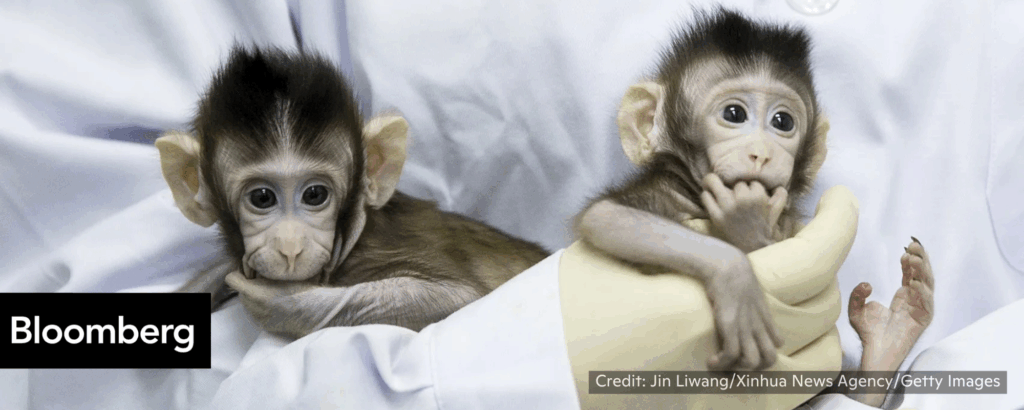 China Ramps Up Experiments on Animals to Help Win Biotech Race
China Ramps Up Experiments on Animals to Help Win Biotech Race
K Oanh Ha & Eleanor Harrison-Dengate, Bloomberg, 11/18/2025
“China is investing heavily in cutting-edge genetic experiments. It’s part of their quest to become a biotech superpower.”
“ . . . China has built eight animal research centers since 2010. And it keeps tens of thousands of animals in these facilities. Scientists can apply to them to get a certain type of monkey or certain type of pig for their research.”
“‘As if gene editing wasn’t controversial enough, China is also pushing into an even more sensitive area of biological research: cloning.’ . . . Actually, China cloned the world’s first dog with a certain gene-edited disease and also it cloned the world’s first monkey with a certain gene-edited disease.’”
“‘And Karoline says the companies involved in gene editing and cloning don’t just run experiments on the animals. They also sell them. Last year, the global market for genetically modified animals in biomedical research was estimated at $15 billion, more than twice what it was less than a decade ago. And China has become one of the biggest suppliers of lab animals in the world.’” 📰 Full Story →
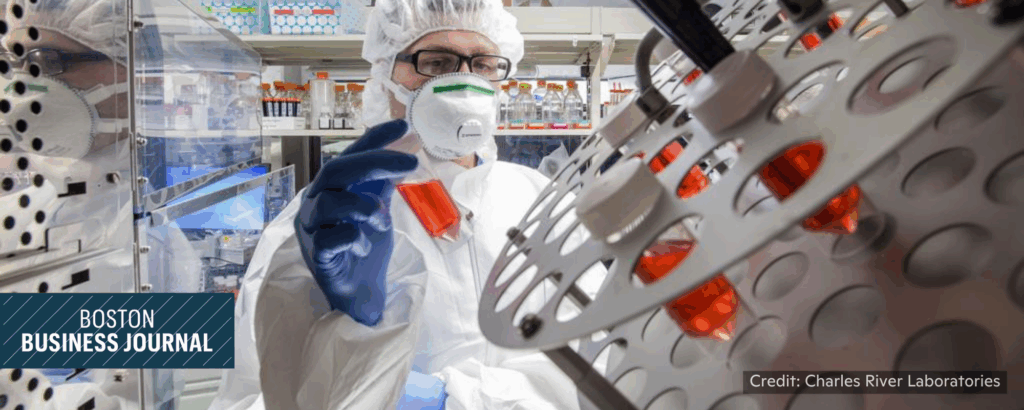 Charles River Laboratories gets all-clear from SEC in monkey smuggling probe
Charles River Laboratories gets all-clear from SEC in monkey smuggling probe
Hannah Baratham-Green, Boston Business Journal, 11/18/2025
“Charles River Laboratories International Inc. has been cleared in the last of a series of investigations involving the company and the trade of non-human primates. The Wilmington-based contract research organization has encountered challenges to its monkey business in recent years, including investigations by the U.S. Department of Justice and the Enforcement Division of the U.S. Securities and Exchange Commission.”
“Most recently, Charles River provided an update this week on an inquiry it received from the Enforcement Division of the U.S. Securities and Exchange Commission in 2023. Charles River was asked to provide information — first voluntarily, and then with a document subpoena and additional inquiries — primarily related to its sourcing of non-human primates. Charles River said the company’s audit committee also brought on counsel to conduct an investigation into some of the issues raised in the SEC investigation. Now, these cases are also closed. The SEC’s Division of Enforcement told Charles River it concluded its investigation and does not plan to recommend an enforcement action by the SEC against the company.”
“A company spokesperson confirmed that the SEC investigation was the last ongoing investigation into Charles River and the trade of non-human primates.” 📰 Full Story →
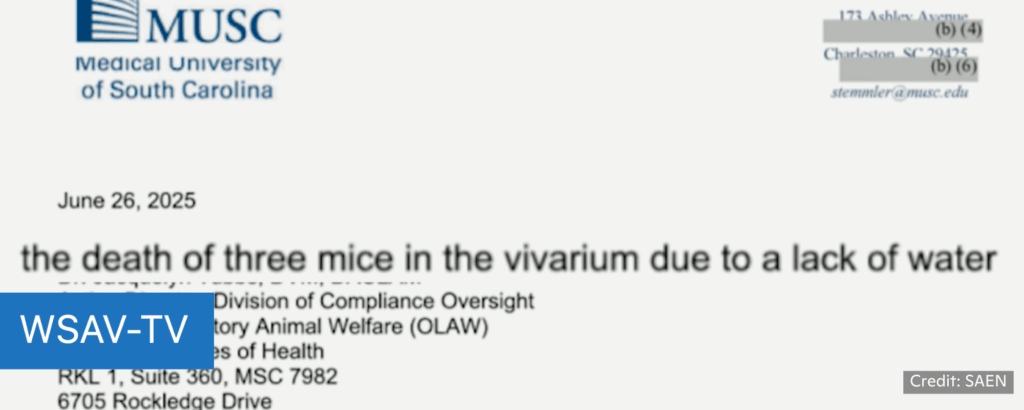 Animal advocate group asks for firings at MUSC after alleged abuse
Animal advocate group asks for firings at MUSC after alleged abuse
Andrew Davis, WSAV-TV, 11/19/2025
“An animal activist group is calling for employees at a Lowcountry hospital to be fired for their neglect, which apparently led to a series of animal deaths . . . Research mice [at the Medical University of South Carolina (MUSC)] were allowed to die of thirst, cooked by a faulty heating system and one even woke up during the surgery being performed because of a lack of anesthesia.”
“[Stop Animal Exploitation Now (SAEN)] has sent a complaint to MUSC’s president requesting changes in the research program and requesting the firings of ‘all staff’ connected to the abuse.” 📰 Full Story →
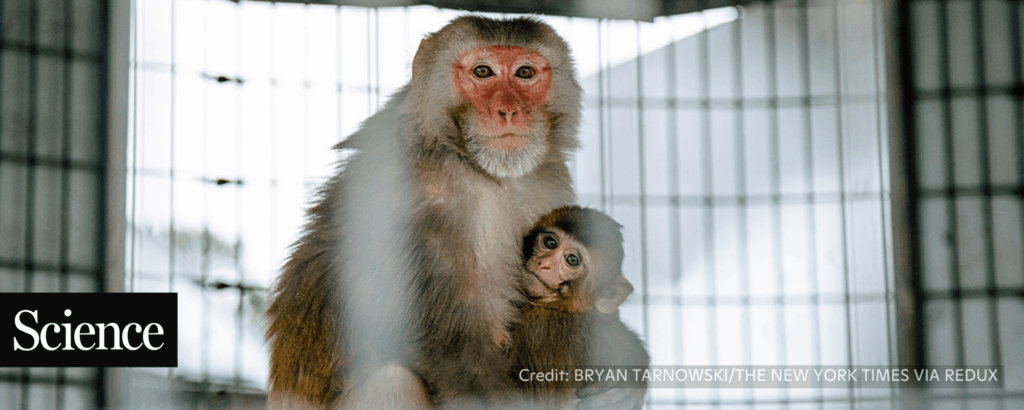 Exclusive: CDC to end all monkey research
Exclusive: CDC to end all monkey research
David Grimm, Science, 11/21/2025
“Scientists at the U.S. Centers for Disease Control and Prevention (CDC) have been told to phase out all of their monkey research, Science has learned. The directive, communicated to CDC staff by a former Department of Government Efficiency (DOGE) employee and recent college graduate who is now a top official at the agency, will end studies on approximately 200 macaques.”
“Apart from the retirement of research chimpanzees initiated by the National Institutes of Health (NIH) a decade ago, the move would mark the first time a U.S. agency has ended its in-house nonhuman primate program . . . The monkeys—a mix of rhesus and pig-tailed macaques housed at CDC’s Atlanta headquarters—have been used to study HIV, hepatitis, and other infectious diseases. HHS aims to approve a plan to shut down the research by the end of the year, according to the government source.”
“CDC did not respond directly to questions about its monkey program.”
“CDC’s monkey program was in jeopardy even before it was ordered to be shut down. A U.S. House of Representatives budget bill that sets 2026 spending levels for CDC would zero out funding for the HIV division at the agency. If the Senate agrees in a final funding bill, studies on most of CDC’s monkeys would end, says a high-level agency source who asked not to be named for fear of reprisal. ‘There seems to be an explicit desire to stop nonhuman primate research in toto.’” 📰 Full Story →
Share this news compilation on X or Bluesky.
Or copy, paste, and share this link on Facebook or anywhere else:
riseforanimals.org/news/news-nov-21-2025